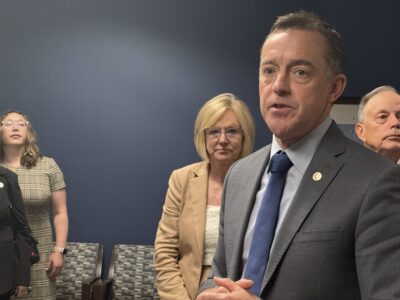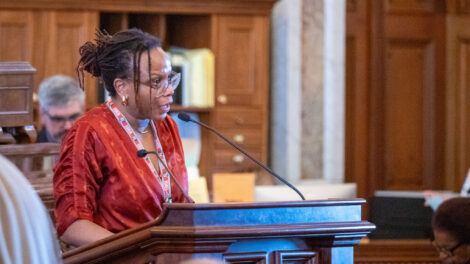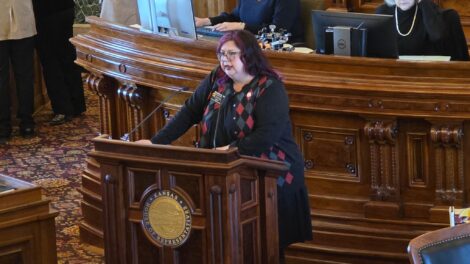Regents begin study that could make changes to tenure system for university faculty members
Board to also study new type of bachelor's degree that would take only three years

photo by: Chad Lawhorn/Journal-World
Blake Benson, chair of the Kansas Board of Regents, speaks at a board event on Wednesday, Sept. 17, 2025. Regent Alysia Johnston, chair of the Academic Affairs Standing Committee, is pictured to the left of Benson.
Getting tenure and its job protections as a university faculty member — and how much work must be done to keep that status — are now officially topics to be studied by the Kansas Board of Regents this fall.
At their meeting on Thursday, the Regents approved a board goal of conducting a “comprehensive review” of the tenure system and related workload polices that are in place at the University of Kansas and other public universities in the state.
The review is expected to be complete by January in order for it to be shared during next year’s session of the Kansas Legislature. A bill weakening the job protections offered by tenure began making its way through the Legislature last session, and is expected to be debated again this year. Opponents of tenure have argued tenure makes it too difficult to fire poor employees, and that the quality of universities suffers as a result.
Among many faculty members, though, tenure is seen as a bedrock protection as they pursue academic freedom and teach ideas and concepts that may not always be popular. In general, tenure makes it difficult to fire professors for teaching ideas that may not be popular in political or social circles.
In a brief interview with the Journal-World following Thursday’s meeting, Regents Chair Blake Benson said he understood the tenure topic was of high interest to faculty members and one that could produce angst.
“We’re going to do it carefully,” Benson said of the pending review “We understand the importance of it, and that’s why we are taking the time to think about it and make those recommendations.”
Blake Flanders, president and CEO of the Regents, added that the board is not going into the review with questions about whether tenure is needed in the profession. At a retreat in July, as the Journal-World reported, university leaders lamented that any erosion of tenure protection would make it extremely difficult for Kansas to recruit top professors and researchers.
“We’re strengthening tenure,” Flanders said.
The actual board goal unanimously approved on Thursday states that the review will examine the frameworks of the tenure system, the post-tenure review system, and the workload policies tied to the tenure system.
“This initiative aims to ensure these frameworks support academic innovation, faculty development, and student success,” the approved goal states.
However, the possibility the tenure system will change is real. Benson said the Regents’ Academic Affairs Standing Committee — which comprises four of the nine members of the Board of Regents — will be responsible for leading the review. That committee, at a minimum, will consult with the provosts of each university, and outreach to faculty members at each school also will occur.
Any recommendations for changes to the systems would come back to the full Board of Regents for approval, Flanders said.
“I expect the full board will weigh in how can we strengthen tenure, plus tenure review and maybe definitions around instructional workload,” Flanders said.
At some point during the process, the study group also may be trying to proactively answer some of the questions they expect lawmakers to have when the issue of tenure likely emerges again during the next session.
Flanders said he thinks it will be important to communicate that while tenure does provide important job protections, they are not absolute.
“We know that tenure is absolutely not a job for life,” Flanders said. “You still have to continue to perform and there is post-tenure review in order to remain a tenured faculty member, and there’s some parameters around instructional workload as well. We want to make sure our policy is clear on that.”
However, while tenure does not guarantee a faculty member’s job, Regents also were told in July that it was rare for a tenured faculty member to be terminated from their position. As the Journal-World reported in July, Regents were told that from 2015 to 2025, a little more than 3.5% of tenured faculty members received an unsatisfactory review and were placed on an improvement plan. A specific number on how many actually were terminated wasn’t provided, but the Regents’ vice president of academic affairs told the board it was a “small percentage.”
As part of Thursday’s meeting, Regents also approved three other board goals for the academic year. They are:
• An update to the board’s strategic plan, Building a Future. The plan focuses on areas such as affordability, innovation, job training and how universities can help spur economic development, among other issues. The plan has been in place since 2020.
• Study the idea of three-year baccalaureate degrees. A bachelor’s degree at a public university in Kansas is required to include at least 120 credit hours of instruction, which normally takes at least four years to complete. However, the organizations that accredit universities now allow some bachelor’s degrees to be completed in 90 to 105 hours, which is possible in a three-year time period.
Several states have universities that are introducing such “reduced credit bachelor’s degrees.” Kansas State University sought to become the first public university in Kansas to offer one, with a degree in uncrewed aircraft systems. However, K-State withdrew its request for approval after it became clear that the Regents wanted to study in depth the potential ramifications of allowing reduced credit bachelor’s degrees.
Several Regents raised questions about whether employers would value the degrees, whether employers would understand the differences between a traditional bachelor’s degree and a reduced credit degree, and also whether such reduced credit degrees would reduce the value of traditional bachelor’s degrees. University leaders also acknowledged the issues around the idea are significant.
“This is a little bit of a game-changer overall, and we need to be very cautious, we need to be very careful on how we bring the conversation,” Kansas State Provost Jesse Perez Mendez told the Regents on Thursday.
• Each state university will submit a report detailing their “current initiatives, research and instructional strategies” related to artificial intelligence. Regent Neelima Parasker, a technology executive by trade, also warned universities to do thorough reviews of the legal risks that could be associated with the AI technology on campus.
“I know we all started with being very, very cautious,” Parasker said. “And then we said ‘OK, the world opened up, we need to open up,’ which is great. I’m not against it, but I am against, now that people are setting their foot on ground, there is a lot more exposure that we don’t know what we don’t know.
“So, keep your legal close to your AI team, is what I would suggest.”




